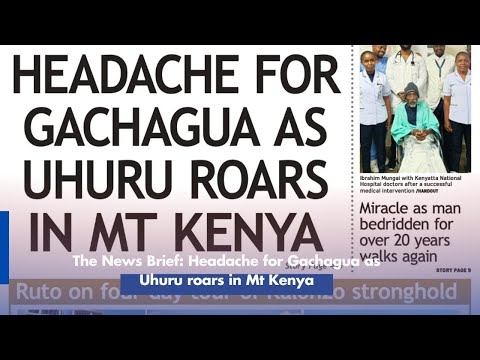

The indigenous Ogiek community’s cry for justice and settlement in the Mau Complex, which they claim as their ancestral land continues to delay, even as the African Court held its historic compliance hearing on Wednesday.
They told the African Court on Human and Peoples’ Rights that the Kenyan government has continued to disregard implementation of the merits judgment of 2017 and the reparations decision of 2022.
Further, the community decried continued violations of their rights through evictions from the complex, a key water catchment resource..
In its judgment on the merits on May 26, 2017, the court found the Kenyan government had violated seven provisions of the African Charter on Human and Peoples' Rights through evictions. Consequently, the government was directed to take all appropriate measures to remedy the violations. It also ordered Kenya to ensure the Ogiek's access to their ancestral lands and to implement legislative and policy reforms.
On the reparations ruling on June 23, 2022, the court ordered Kenya to compensate the Ogiek for material and moral damages, awarding Sh57.85 million for material harm and Sh100 million ($850,000) for moral prejudice. The compensation was to be channelled into a community development fund.
The judges also ordered that the government grants the community a collective title and put measures to prevent further violations of their rights.
The community and the African Commission on Human and Peoples’ Rights, however, argue the government is yet to implement any of the directives.
“None of the remedies to rectify the violations on the Ogiek community have been implemented since the merits judgement of 2017 and the reparations decision of 2022,” commissioner Solomon Dersso told the court.
Lawyers representing the state said there has been partial implementation of the ruling, and that full implementation would be done in “reasonable time”. They argued the non-compliance has not reached “grievous” levels.
Additionally, they said transition due to change of governments, domestic cases filed against the state and the complex nature of the case and Mau Complex had inhibited full compliance.
“Kenya is still within the concept of reasonable time by the Inter-American Court [of Human Rights]. There are also financial complexities of the case, as the state has to establish a fund and deposit money, which requires a legislative process,” said State counsel Charles Mutinda.
He said it is not practical to implement the strict judgment due to “social-political complexities” but noted there has been “meaningful consultation”.
The government conceded it had not published the judgment in the Kenya Gazette, a national newspaper and on the website, with its lawyers forced to withdraw an assertion that they had not received a summarised certified copy of the ruling for publication.
Appearing for the Africa Commission— on behalf of the community —, Senior Counsel Tom Nyadunga disagreed that transition affected the implementation.
“The Ogiek have on different dates unsuccessfully knocked at various offices. These include the Rift Valley Regional Commissioner, Narok County Commissioner, the Council of Governors, Judicial offices, the conservator of Forests and the National Land Commission. All these did not go into transition. Transition is political and does not stop government institutions from implementing the ruling,” Nyadunga said.
He said the domestic cases did not have a stay order and therefore did not stop the implementation.
Further, the petitioners said President William Ruto’s allocation of the Mau Forest land title to Narok county was a violation of the ruling.
Minority Rights Group International said the hearing, which was postponed in February on the request of the state, means a lot for the Ogiek.
“They leave the court today with renewed hope and a sense of justice being within reach. This hearing is not just another step in their long struggle — it's a defining moment. It also marks a milestone in advancing indigenous peoples' rights jurisprudence across Africa,” Samuel Ade Ndasi, AU Litigation and Advocacy Officer at Minority Rights Group, said.
“These actions risk causing irreparable harm to the Ogiek’s land rights, which have been unequivocally upheld by the African Court. I urge the Government of Kenya to immediately cease all activities that undermine the Ogiek’s rights and to fully comply with the Court’s rulings,” he said.
The court is now expected to rule on whether Kenya has complied with its orders and may issue further directives, including interim measures to prevent ongoing harm and a demand for a detailed implementation roadmap. A ruling could be delivered as early as the end of this month or at the Court’s next session.
INSTANT ANALYSIS
The Ogiek people, an indigenous community in Kenya, have a landmark case before the African Court on Human and Peoples' Rights regarding their land rights and the Kenyan government's obligations to them. The court has issued judgments recognizing the Ogiek as indigenous and entitled to protection, demanding compensation for past wrongs, and mandating actions to secure their land rights.


















